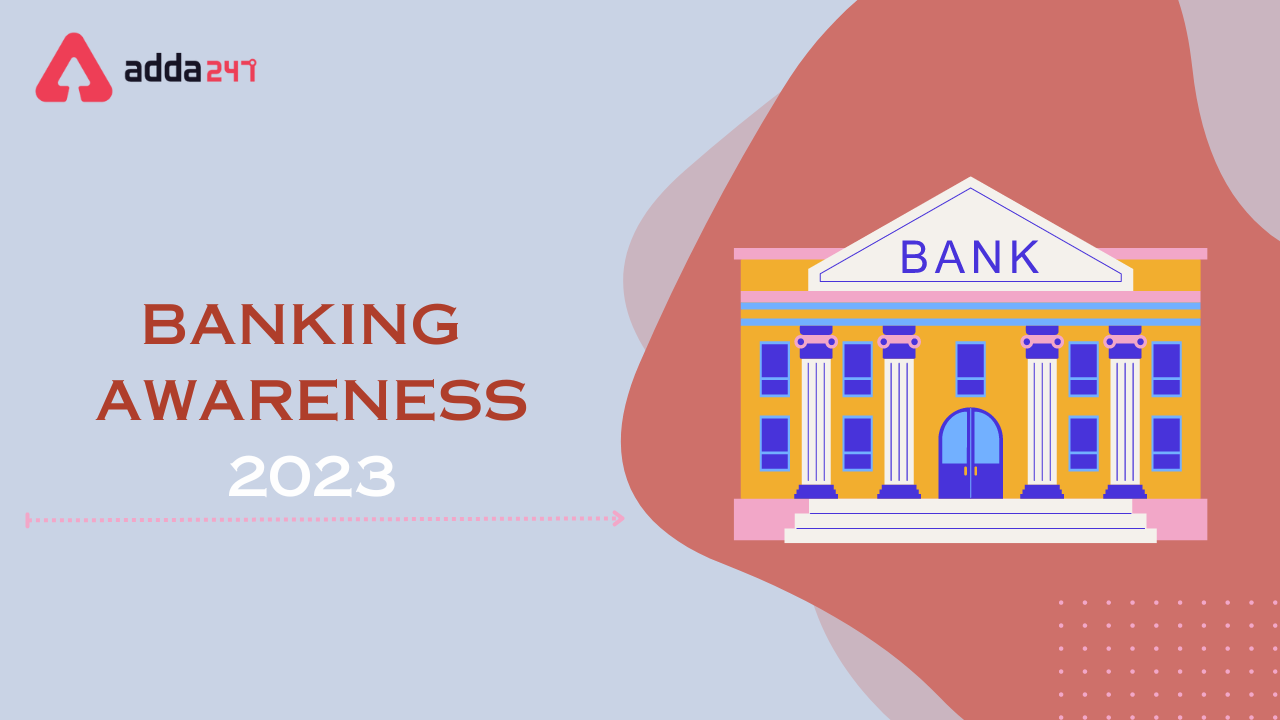Table of Contents
Banking Awareness for All Bank Exams in India
Banking Awareness is one of the most important topics in all Banks Exams conducted in India. Every year many candidates appear for the various bank exams conducted in India like the IBPS RRB Exam, IBPS PO, IBPS Clerk, SBI PO, SBI Clerk, IDBI Bank Exams, and many others. While preparing for these exams, candidates need to prepare a topic called “Banking Awareness” which assesses candidates’ knowledge about banks and the banking industry. If candidates study this section well and understand the concepts, they can score well in their exams. In this article, we have provided all the information about Banking Awareness for the year 2023, which is relevant for exams like IBPS, RBI, SBI, and others.
Why is Banking Awareness Important?
Banking Awareness is an important part of bank exams, which test how much candidates know about the banking sector. It helps banks find people who can handle banking questions and situations well. Understanding banking is also crucial for bankers to serve customers better, make good financial decisions, and keep the banking system stable. Also, the Banking Awareness section is usually easier to score in compared to other parts of the exam. Candidates who know about banking can do well in this section. Unlike other sections that may have difficult math problems, Banking Awareness questions are more about knowing facts. This section offers a chance to do well without needing complex calculations, making it important for those who want to excel in bank exams.
Banking Awareness Syllabus
The topics included in the Banking Awareness Syllabus for the various bank exams like IBPS Clerk, SBI Clerk, SBI PO, IBPS PO, and other exams have been listed in the table below. Candidates can mark these topics and make sure that these topics are covered by them while preparing for the various exams to get a Bank Job. Check the Banking Awareness Syllabus topics here.
| Topic | |
|---|---|
| Banking History and all the first in Banking | First recorded banking activity |
| RBI Structure and Functions | Established in 1935 |
| Types of Bank Accounts in India | Savings Account |
| Non-Performing Assets (NPA) | Introduced in the 1990s |
| SARFAESI Act | Enacted in 2002 |
| Deposit Insurance and Credit Guarantee Corporation | Formed in 1962 |
| Accounts of NRI/PIO | NRI accounts were introduced in the 1970s |
| Codes used in the Banking Sector Part 1 | IFSC (Indian Financial System Code) |
| Codes used in the Banking Sector Part 2 | MICR (Magnetic Ink Character Recognition) |
| Transfer System in India | NEFT (National Electronic Funds Transfer) |
| ATM in India | The first ATM was installed in 1987 |
| Types of Cards | Credit Card |
| Risks in Banking Sector | Credit Risk |
| Role of Banking Ombudsman in the Banking Sector | Introduced in 1995 |
| Basel III Accord | Implemented in 2013 |
| Financial Markets in India | Established in the 19th century |
| Negotiable Instruments (NI) | Cheques |
| Government Securities Market in India | Government Bonds |
| Inflation-Indexed Bonds (IIBs) | Introduced in 2013 |
| Non-Banking Financial Company (NBFC) | Started in the 1960s |
| Foreign Investment in India | FDI (Foreign Direct Investment) |
| Remittances | MTSS and RDA |
| Small Banks in India | First small bank licensed in 1997 |
| Different Types of Money Transfers in India | IMPS (Immediate Payment Service) |
| Financial Inclusions | Jan Dhan Yojana |
| Government Schemes related to Banking Sector | PMJDY (Pradhan Mantri Jan Dhan Yojana) |
| Financial Institutions and Regulators in India | RBI, SEBI, IRDAI, PFRDA, etc. |
| External Commercial Borrowings (ECB) and Trade Credit | Allowed in 1991 |
| Rupee Denominated Bonds | Introduced in 2013 |
| Types of Money and Measures of Money Supply | M0, M1, M2, M3, M4 |
| Currency Circulation and Management in India | RBI regulates currency supply |
| Lending Rates | Repo Rate, Reverse Repo Rate |
| Nationalization of Banks in India | Happened in 1969 and 1980 |
| Monetary Policy | Tools to control the money supply |
| Ratings of Banks | CRISIL, ICRA, CARE, etc. |
| Marginal Cost of Funds based Lending Rate (MCLR) | Introduced in 2016 |
| Banking News of April | Recent developments in April |
| Banking Related Schemes | PMMY, PMAY, etc. |
Types of Banks in India
In India, there are different kinds of banks that serve the needs of people, businesses, and the whole economy. These banks play a crucial role in our financial system, offering important services and helping the country’s economic growth. So, the different types of banks in India which form a strong foundation for our financial system, ensuring that people have access to banking services and helping our country’s economy grow and prosper have been listed in the table below.
| Type | Description |
|---|---|
| 1. Nationalised Banks | Banks that were previously private were later taken over by the government and converted into public sector banks. |
| 2. Central Bank | The Reserve Bank of India (RBI) serves as the central monetary authority and regulator of the banking system. |
| 3. Public Sector Banks | Banks where the majority of the stake is owned by the government. They play a crucial role in the nation’s economic development. |
| 4. Private Sector Banks | Banks which are owned and operated by private entities and are not under government control. |
| 5. Export Credit Guarantee Corporation of India Ltd. | A government-owned financial institution that provides export credit insurance facilities to Indian exporters. |
| 6. Commercial Banks | Banks that offer various financial services to individuals, businesses, and organizations. |
| 7. Exim Bank of India | The Export-Import Bank of India was set up to facilitate international trade and boost exports from India. |
| 8. Co-operative Banks | Banks that are owned and operated by cooperative societies or groups provide banking services. |
| 9. Payment Banks | Banks that offer payment services and remittance facilities but do not engage in lending activities. |
| 10. Small Finance Banks | Banks are primarily set up to provide financial services to small and underprivileged sectors of society. |
| 11. Regional Rural Banks | Banks that cater to the banking needs of rural areas are jointly owned by the central government, state governments, and sponsor banks. |
General Awareness For Bank Exams
Banking Awareness is an important topic covered in various competitive exams and interviews for banking jobs. General Awareness related to banking is given significant importance in various bank exams in India. It involves having a solid understanding of both national and international static aspects. However, candidates must also stay updated on current events worldwide and the ever-changing trends in the banking industry. Below, we have compiled some essential topics relevant to the General Awareness section of banking exams.
- National Parks present in India.
- Wildlife Sanctuaries present in India.
- Important dates, timings.
- ICC World Cup winners.
- Books and authors.
- Insights about state and capital.
- Capital, country, and currency.
- Dams present in India.
- Neighboring countries of India.
- Stadiums.
- Dance and art forms of India.
- Cabinet Ministries.
- Government Schemes.
- List of Governors.



 Railway RPF Constable Result 2025, RPF R...
Railway RPF Constable Result 2025, RPF R...
 RRB Technician Grade 3 DV Admit Card 202...
RRB Technician Grade 3 DV Admit Card 202...
 Central Bank Credit Officer Admit Card 2...
Central Bank Credit Officer Admit Card 2...





